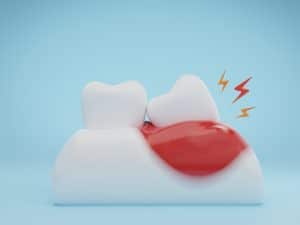If you’ve ever experienced a sharp, sudden pain while eating hot food, you are not alone. Tooth sensitivity to hot temperatures is a common issue that many people face. But what causes this discomfort, and how can you relieve it? This article explores the reasons behind tooth pain when eating hot foods and provides insights into potential solutions.
What causes tooth pain when eating hot foods?
Several factors can cause tooth pain from hot food, often linked to the condition of your teeth and gums. Here are some common causes:
- Sensitive teeth: Tooth sensitivity happens when the enamel wears down, exposing the dentin, which causes discomfort when eating hot foods.
- Gum recession: When gums recede, the roots of the teeth may be exposed, leading to increased sensitivity and pain from temperature changes.
- Enamel erosion: Acidic foods and drinks can erode enamel, making teeth more vulnerable to hot and cold sensations, leading to discomfort.
- Dental cavities: Cavities create holes in the teeth that expose sensitive inner tissue, causing pain when hot food reaches these areas.
- Cracked or broken teeth: A cracked tooth can allow heat to irritate the nerve endings inside, causing sharp pain when consuming hot food.
Could it be a sign of a dental issue?
Tooth pain when eating hot food can sometimes indicate an underlying dental problem. Here’s what could be happening:
- Tooth decay: Untreated cavities can worsen, causing pain when consuming hot foods. It’s vital to address cavities before they lead to more severe dental problems.
- Gum disease: Conditions like gingivitis and periodontitis can cause tooth sensitivity. Inflammation of the gums affects the tooth’s support structure, resulting in discomfort when eating hot food.
- Root infection: Tooth pain may signal a root infection, which heat from food can trigger. This infection may require a root canal treatment to resolve.
- Damaged fillings: A loose or damaged filling exposes the tooth to temperature changes, causing pain. If compromised, seek a dentist for a replacement.
How does gum recession affect tooth sensitivity?
Gum recession occurs when the gum tissue surrounding your teeth shrinks back, revealing the normally covered tooth roots. This exposes the sensitive root surface, making teeth more susceptible to discomfort, particularly when consuming hot foods.
- Exposed roots: The root of your tooth does not have enamel to protect it, making it more susceptible to temperature changes. When exposed to hot food, you may feel a sharp pain.
- Increased risk of cavities: Receding gums can expose areas of your teeth that are prone to decay. This makes them more vulnerable to cavities, which can further worsen tooth sensitivity.
- Inflammation: Gum recession can sometimes be caused by gum disease, which can lead to swelling and tenderness around the gums. This may intensify the discomfort when eating hot foods.

What role does enamel erosion play in tooth pain?
Enamel is the protective outer layer of your teeth, and its erosion can contribute significantly to tooth pain, especially when eating hot food. Here’s why:
- Weakened protection: Enamel erosion leaves your teeth vulnerable to temperature fluctuations. Without the protective layer, your teeth may react more sharply to hot foods.
- Acidic foods and beverages: Regularly consuming acidic foods and drinks like citrus, soda, and coffee can slowly erode enamel over time. This can increase tooth sensitivity and lead to pain when eating hot foods.
- Brushing too hard: Brushing your teeth too forcefully or using a hard-bristled toothbrush can damage the enamel, leading to increased sensitivity.
Can a tooth infection cause pain with hot food?
Yes, a tooth infection can make your tooth sensitive to heat. When the inner pulp of the tooth becomes infected, it can cause severe pain, especially when exposed to hot food. Here’s how:
- Inflammation: An infected tooth can cause inflammation inside the tooth and around the gums. The heat from food can exacerbate this inflammation, leading to sharp, throbbing pain. Dentin hypersensitivity treatment may help alleviate discomfort caused by tooth infections and sensitivity to hot foods.
- Abscesses: A tooth abscess occurs when pus collects around the infected tooth. This can lead to extreme sensitivity when eating or drinking anything hot or cold.
- Nerve irritation: Tooth infections can irritate the nerves inside the tooth, making them more responsive to temperature changes. This can result in discomfort when eating hot foods.
Are there ways to prevent tooth pain when eating hot foods?
Preventing tooth pain when eating hot foods involves a combination of good dental hygiene and proper care. Here are some tips to help:
- Regular dental check-ups: Visit your dentist regularly for cleanings and check-ups to catch any dental issues early. Preventative dental care can help avoid future tooth sensitivity and other oral issues.
- Use a soft-bristled toothbrush: Brushing gently with a soft-bristled toothbrush helps protect against enamel erosion and gum recession. Be sure to avoid applying excessive pressure while brushing.
- Fluoride toothpaste: Use toothpaste designed for sensitive teeth. Fluoride toothpaste can help strengthen enamel and reduce sensitivity.
- Avoid acidic foods: Reduce your intake of acidic foods and drinks like citrus, soda, and coffee, as they can wear down enamel over time and heighten sensitivity.
When should you visit the dentist for tooth pain?
If you experience tooth pain when eating hot foods, it’s important to pay attention to the severity and frequency of the pain. Knowing when to see a dentist for tooth sensitivity can help prevent more serious dental issues. You should consult a dentist if:
- The pain persists: If the tooth pain lasts for more than a few days, it may indicate an underlying issue that requires professional treatment.
- The pain intensifies: If the pain becomes more intense or spreads to other areas of your mouth, it may be a sign of a more serious problem, such as an infection or cavity.
- Pain is accompanied by swelling or fever: These symptoms could indicate an infection or abscess, which requires immediate dental care.
What are the benefits of seeking professional dental care for tooth pain?
Seeking professional dental care for tooth pain offers many benefits, including:
- Accurate diagnosis: A dentist can identify the root cause of your tooth pain and provide effective treatment options.
- Relief from pain: Treatment options, such as fillings, crowns, or root canals, can provide relief from tooth pain and prevent it from returning.
- Long-term oral health: Regular visits to the dentist ensure that any dental issues are addressed before they become more severe, helping you maintain long-term oral health.

Prevent tooth pain with preventative dentistry at Marsfield Dental Care
At Marsfield Dental Care, we understand the importance of preventing dental issues before they cause discomfort. Our comprehensive range of services, including preventative dentistry, helps ensure that your teeth remain healthy and pain-free. If you’re experiencing tooth pain when eating hot food, don’t wait – book an appointment at Marsfield Dental Care and take the first step towards a pain-free smile.

